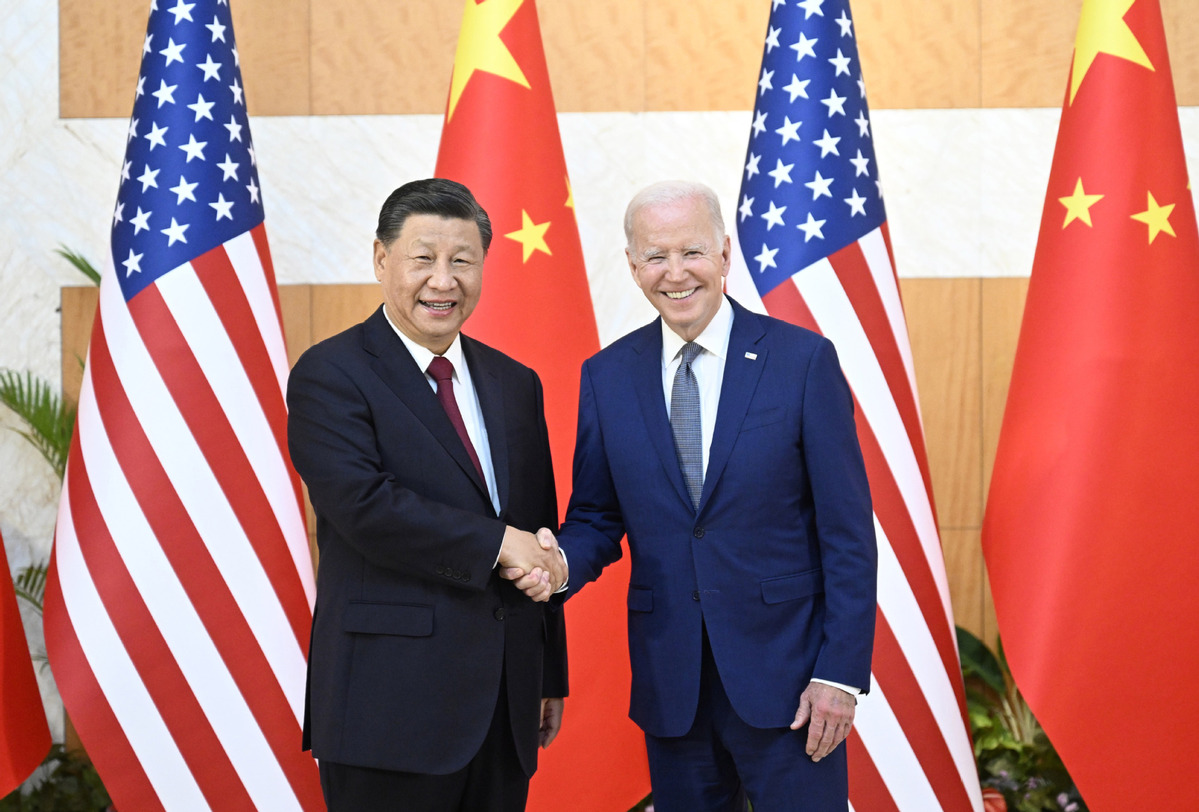Did the Xi-Biden meeting usher in a new dawn for relations?
By Du Lan | chinadaily.com.cn | Updated: 2022-11-21 17:10

Chinese President Xi Jinping and US President Joe Biden had an in-depth, candid and constructive meeting which lasted more than three hours on Nov 14 in Bali, Indonesia. This was their first face-to-face summit since Biden took office, and their first interaction after China and the United States completed their respective major domestic agendas this year. There is no doubt this meeting is of great significance for the bilateral relationship and the world.
First, the dialogue was candid and rich. The two heads of state had strategic discussions on major issues concerning China-US relations and the prospects for world peace and development, including their respective domestic and foreign policies, China-US relations, the Taiwan question, dialogue and cooperation in various fields, and major international and regional issues. Xi made clear China's position and attitude on some major issues of interest to the United States. The two presidents also had an in-depth exchange of views on international and regional issues, including the Ukraine issue and the Korean nuclear issue.
This profound exchange between the two leaders is helpful for the two sides to enhance mutual understanding and avoid miscalculations. As State Councilor and Foreign Minister Wang Yi concluded, the Bali meeting has achieved the intended purpose of having in-depth communication, clarifying intentions, making clear where the red lines are, preventing conflicts, setting the direction and exploring cooperation.
Second, the meeting sends a positive signal for managing relations and strengthening cooperation. Head-of-state diplomacy is the anchor of China-US relations. The first face-to-face meeting between the two heads of state in three years shows both sides attach great importance to developing bilateral relations. There is consensus between the two leaders that the current state of China-US relations is not in the fundamental interests of the two countries and peoples and is not what the international community expects. It is urgent to conduct interactions at the strategic level to manage the rivalry, which is also a responsibility for China and the United States as great powers.
During the summit, the leaders committed to keeping channels of communication open between the two presidents and at all levels of government, so as to allow candid conversations on issues where the two sides disagree, and to strengthen necessary cooperation and play a key role in addressing climate change, food security and other important global challenges. These are all exchanges or cooperations that were suspended after Nancy Pelosi's visit to Taiwan. Given the volatile political and economic situation in the world, these outcomes between the two major countries are a positive signal and can increase confidence in global stability and motivate development.
Third, actions speak louder than words. China-US relations have been roiled in recent years by growing tensions over issues ranging from Hong Kong and Taiwan to the South China Sea, trade practices and US restrictions on Chinese technology. The main reason is the United States misreads and misjudges China's development and foreign policy. There is a growing bipartisan consensus China is a threat, and reversing such perceptions would be difficult. According to the National Security Strategy report released by the Biden administration months ago, China is regarded as the "most consequential geopolitical challenge" the US faces and the only competitor with both the intent and capacity to reshape the international order. Obviously, the US misinterpretation of China's policy intentions and long-term prospects has led to tensions in China-US relations and increased instability and uncertainty in the world.
The meeting between the two presidents is important for strategic management of China-US relations. At the same time, it should be noted under the influence of intensified domestic political struggles and other factors, the US side will not easily stop manipulating the "China threat" and stop smearing and containing China, and the contest between China and the US will likely remain fierce and complex in the coming period.
American politicians should realize China and the United States can coexist peacefully and that it's possible for the two countries to share in and contribute to human progress. China-US interactions should be defined by dialogue and win-win cooperation, not confrontation and zero-sum competition. The future of China-US relations lies in the new strategic framework the two sides are willing to and able to establish and the reasonable approach to achieving "competitive coexistence." To achieve this goal, the presidents of the two countries need to have more in-depth exchanges, and more importantly the US side should demonstrate sincerity and walk the talk.
Du Lan is deputy director and associate research fellow at the China Institute of International Studies' department of Asia-Pacific studies.
The opinions expressed here are those of the writer and do not necessarily represent the views of China Daily and China Daily website.
If you have a specific expertise, or would like to share your thought about our stories, then send us your writings at opinion@chinadaily.com.cn, and comment@chinadaily.com.cn.
























